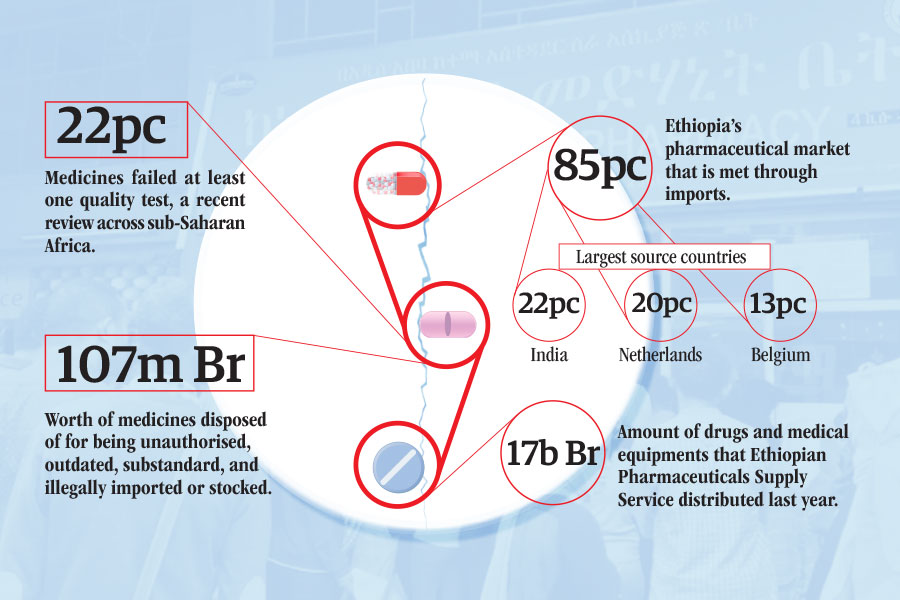
Commentaries | Jun 14,2025
Jun 1 , 2019
By Senay Lemma , Solomon Girma
Ethiopia is investing billions of dollars to open a total of 30 industrial parks by 2025 with the vision to become Africa's manufacturing hub. This long-term project is part of the country’s ambition to achieve middle-income status by specialising in labour-intensive, light manufacturing activities. Eight industrial parks have been launched since 2014. When all of the planned parks become operational, two million job opportunities will be created and annual revenues of thirty billion dollars will be generated from textile and apparel exports alone. This is an extremely ambitious endeavour as textile exports currently stand at a mere 145 million dollars, reflecting the poor level of manufacturing in general, whose contribution to GDP stands below 10pc.
The government aims to achieve its ambitious plans by attracting foreign direct investment and taking advantage of rising labour prices in China and elsewhere in Asia. Foreign investors receive extremely generous incentive packages, including exemption of taxes on profits for the first 10 years of operation, zero income taxes for expatriate employees for the first five years of operation and exception of any import duties for imported intermediary goods and raw materials. These attractive incentives, coupled with the country’s abundant and cheap labour force, has attracted notable players in the apparel industry, including the likes of PHV, JC Penny, the Children’s Place and H&M.
Hawassa Industrial Park (HIP) alone now hosts fifty manufacturing sheds that employ 25,000 workers and is expected to eventually grow to 60,000. HIP features modern facilities that include well-ventilated, plug-and-start factory sheds, direct road connectivity and a state-of-the-art wastewater treatment system that enables “zero liquid discharge”. However, HIP has proven that creating an entirely new industry, however well-designed and thought through, takes more than building modern infrastructure.
Recently, employment practices at HIP have caused significant controversy, as media reports revealed the extremely high turnover that suggested significant employee dissatisfaction. The government’s recent audit indicated an attrition rate of 92pc, suggesting that most workers, perhaps with the exception of managers, abandon their jobs within a year. On some occasions, the increasing discord between employees and employers led to strikes that disrupted production.
What is driving workers away? A recent New York University Stern Center for Business and Human Rights report suggests that the reasons for the high turnover rate include low wages, poor manager-supervisor relationships and poor working conditions. The monthly base wage, not including benefits, for apparel workers is now set at 750 Br, or 26 dollars, which is the lowest wage rate among textile workers anywhere in the world. By comparison, the average monthly wage for a garment worker in Kenya is 207, Cambodia 170, Lesotho 146, Bangladesh 95, India 78 to 136 and Sri Lanka 66 dollars.
Not surprisingly, the employers blame low employee productivity for the low wages. According to the Stern Center report, worker efficiency figures among the companies in HIP varies from as low as 15pc to as high as 75pc.
It is, however, equally valid that very low wages might have depressed worker motivation and undermined performance. Companies also suffer from high turnover, as they are forced to spend time and money to train new workers, and also lose out on the efficiency of experienced workers. Breaking this chicken-and-egg problem, therefore, will necessitate interventions that need the strong involvement of the government and employee associations.
Another major factor behind the high employee turnover rate appears to be poor manager-supervisor relationships. Recent media reports highlight frequent and intense cultural clashes between foreign middle managers and Ethiopian production workers. Most workers are young women who come from rural areas and are unfamiliar with industrial custom of abiding by strict time schedules and routine practices.
As foreign managers complain about poor employee discipline, such as random absenteeism and tardiness, many employees feel insulted by what they feel are "abusive" practices by "foreigners". Disillusioned, many workers are thus leaving HIP.
After almost two years of operation, the Hawassa Industrial Park has failed to live up to its expectations of creating decent employment opportunities and generating badly-needed foreign currency. Some company executives fear that the Hawassa experiment would collapse altogether. This would be a sign of trouble for the government, which has invested billions in the industrial parks and sees them as the pillars of its development strategy. What should be done to save HIP and the government’s cornerstone growth strategy?
First and foremost, the government and other involved parties need to increase the current base salary by setting a minimum wage that guarantees decent living wages. The low worker productivity cited by managers is unlikely to be the sole reason behind exceedingly low salaries, since the balance of power between workers and employers is currently skewed toward the latter. For example, workers at HIP are not currently allowed to form trade unions. In this condition, the government needs to apply pressure on employers to agree to higher wage standards.
Considering the high level of incentives that the plants receive, it is only fair that they are expected to pay decent wages. The government may wish to consider applying a more selective incentive structure that rewards plants that pay greater wages. To boost the competitiveness of plants, the government needs to intervene on multiple fronts, starting from streamlining infrastructure and administrative processes, for example, by harmonizing logistics and customs services, subsidizing training costs and opening training facilities.
To maintain employment, companies at HIP simply have to pay competitive wages, that is far higher than what they currently pay. The cost of living, labour productivity, prevailing wage rates and other factors should be taken into account in setting the minimum wage.
It is likely that the current base wage will have to be raised to at least 70 dollars per month to pay employees a liveable wage. Which will be roughly 59 dollars in nominal value after the mandatory income tax and pension contribution deduction.
There is a need to make time for employees to acquire the required information and skills through sufficient on-boarding programmes. Better onboarding will reduce employee turnover by empowering new employees and enabling them to cope with the challenges of working in a new environment. Such a programme also needs to include training on basic work ethics and worker expectations. This needs to be accompanied by sufficient training and development programmes to mitigate low worker efficiency and broaden the diversity of skill sets.
Finally, there is a need to introduce a more inclusive, broad-based and humane human resources management practice. An important part of this is developing the cross-cultural understanding and ethical practices of mid-level managers. Strong cultural sensitivity, sufficient appreciation of the local context and a decent understanding of the needs of employees by middle managers can go a long way in alleviating some issues that underlie high turnover among industrial parks.
Managers need to develop and nurture humane relationships that acknowledge and appreciate the value of their employees in order to successfully attract, develop and retain motivated employees. Small steps can go a long way. Little actions such as organising peer groups, sporting events, employee days and holiday parties can all be rewarding and stimulate social interaction.
The challenges facing HIP are multi-faceted, as they touch upon various aspects of economic policy, industrial relations, labour management and various social issues. Since these complex challenges do not have a single, conclusive answer, it would be wise to start by initiating a genuine stakeholder engagement that actively involves employee associations, factory leadership, government offices and local communities.
We cannot afford to miss this opportunity as a country; otherwise, the precedence would be grave to the overall development endeavour. In the end, however, a systematic and deliberative approach needs to be established to continually identify the challenges facing HIP and other industrial parks and devise suitable policy and managerial solutions.
PUBLISHED ON
Jun 01,2019 [ VOL
20 , NO
996]

Commentaries | Jun 14,2025

Fortune News | Oct 08,2022

Fortune News | Sep 08,2024

Delicate Number | May 24,2025

Fortune News | Jun 01,2019

Fortune News | Aug 11,2024

Radar | Dec 15,2024

Featured | Sep 13,2022

Featured | Jun 29,2025

Radar | Sep 03,2022

My Opinion | 131507 Views | Aug 14,2021

My Opinion | 127863 Views | Aug 21,2021

My Opinion | 125841 Views | Sep 10,2021

My Opinion | 123471 Views | Aug 07,2021

Dec 22 , 2024 . By TIZITA SHEWAFERAW
Charged with transforming colossal state-owned enterprises into modern and competitiv...

Aug 18 , 2024 . By AKSAH ITALO
Although predictable Yonas Zerihun's job in the ride-hailing service is not immune to...

Jul 28 , 2024 . By TIZITA SHEWAFERAW
Unhabitual, perhaps too many, Samuel Gebreyohannes, 38, used to occasionally enjoy a couple of beers at breakfast. However, he recently swit...

Jul 13 , 2024 . By AKSAH ITALO
Investors who rely on tractors, trucks, and field vehicles for commuting, transporting commodities, and f...

Jun 28 , 2025
Meseret Damtie, the assertive auditor general, has never been shy about naming names...

Jun 21 , 2025
A well-worn adage says, “Budget is not destiny, but it is direction.” Examining t...

Jun 14 , 2025
Yet again, the Horn of Africa is bracing for trouble. A region already frayed by wars...

Jun 7 , 2025
Few promises shine brighter in Addis Abeba than the pledge of a roof for every family...

Jun 29 , 2025
Addis Abeba's first rains have coincided with a sweeping rise in private school tuition, prompting the city's education...

Jun 29 , 2025 . By BEZAWIT HULUAGER
Central Bank Governor Mamo Mihretu claimed a bold reconfiguration of monetary policy...

Jun 29 , 2025 . By BEZAWIT HULUAGER
The federal government is betting on a sweeping overhaul of the driver licensing regi...

Jun 29 , 2025 . By NAHOM AYELE
Gadaa Bank has listed 1.2 million shares on the Ethiopian Securities Exchange (ESX),...